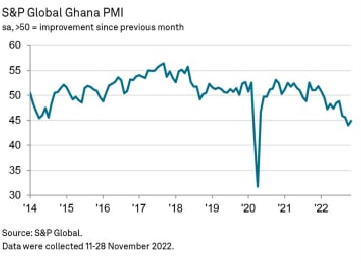Business conditions in Ghana’s private sector continued to deteriorate markedly in November, as currency weakness and steep inflationary pressures hit demand. In fact, the latest increase in output prices was the sharpest since the survey began in January 2014.
The S&P Global Ghana Purchasing Managers’ Index™ registered 44.9 in November, up from 44.0 in October but still pointing to a marked decline in health of the private sector midway through the final quarter of 2022. Business conditions have now deteriorated in each of the past ten months.
The main factor hindering private-sector firms in November was strong inflationary pressures. Overall input costs increased rapidly at a pace that was among the sharpest in the past eight years.


Steep rises in both purchase prices and staff costs were signalled. Firms linked higher purchase costs to currency weakness and rising fuel prices. Widespread cost of living pressures led companies to increase staff pay accordingly.
As a result, wage costs rose markedly and to the greatest extent since August 2014.
The passing on of higher input costs to customers led to a series-record increase in selling prices. The rapid pace of inflation surpassed the previous record in August, as close to 44% of respondents raised their output charges during November.
Severe price pressures, deteriorating economic conditions and financial pressures at clients’ end led to a reduction in new business. The fall in new orders was the ninth in as many months and the rate of contraction was marked, despite easing from that seen in October.
The hit on demand caused by strong price rises led to a steep decline in business activity, extending the current sequence of contraction to 11 months. As with new orders, the pace of reduction was softer than that seen in October – but sharp nonetheless and one of the fastest on record.
Lower activity requirements and difficulties in paying staff led companies to scale-back workforce numbers. Employment decreased for the fifth month running, albeit at a modest rate. Despite the drop in staffing levels, there remained a lack of pressure on capacity; and backlogs of work depleted at the fastest pace in two-and-a-half years.
Meanwhile, purchasing activity also decreased amid declining demand and higher prices for inputs. Input-buying was down for the seventh month running, and at a marked pace. A similar picture was seen with regard to inventories, while weaker demand for inputs enabled suppliers to speed up their deliveries.
Concerns about the impact of currency weakness and inflationary pressures on the private sector meant that business sentiment remained muted in November, despite improving from the previous month. Where optimism was signalled, companies expressed hope that prices will stabilise and economic conditions improve over the coming year.
Andrew Harker, Economics Director at S&P Global Market Intelligence said: “Companies in Ghana continued to struggle in the face of substantial inflationary pressures in November. Efforts to recoup rising costs led to a record increase in selling prices, but this had the knock-on effect of causing further declines in new orders and business activity.
“For now, firms are battling their way through the financial storm and hoping that economic conditions start to improve at some point soon. Unless any major changes occur, the year-end is likely to remain challenging.”
Source: thebftonline.com





